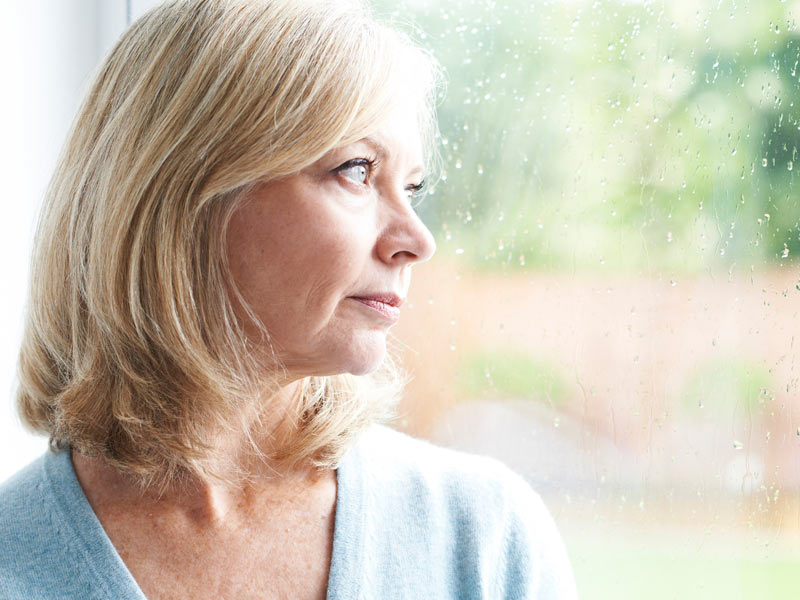
Irritability, sadness and constantly changing mood is something that most of the women experience before their menopausal phase. The time period that lead you to the stage of menopause is no less than a physical and emotional rollercoaster for a woman. Menopause tends to mark the end of the menstrual cycle that tends to occur when a women is in her 40s or 50s. During this phase a woman might experience various discomforting symptoms such as hot flashes, fatigue, mood swings, tension, anxiety and aggressiveness. Where these emotional changes are said to be a normal part of menopause, a woman durig this time feels like being in a constant state of Premenstrual syndrome. Sometimes these symptoms tend to alleviate to an extent that they take the shape of depression. These emotional changes, hot flashes and insomnia tend to occur due to the decline in the estrogen levels of the body. Let us take a deep dive into this article and learn more about the relationship between menopause and depression alonhg with a few ways in which one can manage this condition with Dr. Neha Lal, Consultant Psychiatrist, Jain Multispeciality Hospital.
Table of Content:-
What is Menopause?

Image Credits- Kangroo Care
Also Read: Going Through Menopause? Psychiatrist Tips To Maintain Mental Stability During This Phase
Menopause marks the end of a woman’s menstrual cycle that occurs between the age of 40 to 50 years. This condition is diagnosed when a woman has gone for over 12 months without menstruating or having her periods. It is a naturally occurring biological process that comes in with various uncomfortable physical symptoms. Menopause is a phase of many hormonal changes occurring in a woman’s body; depleting Estrogen being one of them. Estrogen is known to have a direct impact on the mood of a person. Around menopausal age, a woman also experiences other medical illnesses like cardiovascular problems, vascular disorders, osteoporosis, urinary inconitence which can impact their overall functioning. Sleep disturbances further compound the problem. Some of the common symptoms that many women experience during this phase are-
- Hot flashes
- Fatigue
- Chills
- Night sweats
- Vaginal dryness
- Changing mood
- Slow metabolism
- Weight gain
- Hair loss
- Sleep problems
- Anxiety
This condition is caused due to a decline in reproductive hormones such as estrogen.
What is Depression?
Depression can simply be understood as a disabling mental disorder which has a significant impact on one’s personal, social and occupational life. Depression per se is known to be more common among women than men. Menopause is further associated with around 3 fold increased chances of depression as per studies. It is important to understand the various underlying causes for the same before we can tackle it efficiently.
Relation Between Menopause and Depression

Image Credits- Hehigh Centre
Also Read: What Is Smiling Depression? Know The Risk Factors and Symptoms
Around menopause, women experience many bodily changes. This can have an impact on their confidence and self esteem. It can also cause anxiety and depressive symptoms which might be mistaken for menopausal symptoms. However depressive symptoms are more serious and should be addressed sooner. There are several other factors as well that makes a woman more vulnerable to depression during this phase such as-
- Hormonal Changes/ Fluctuations- Hormones play a very important role in our body and a change or fluctuation in their levels tend to have an impact on the entire system. As a women approaches towards menopause and is in her premenopausal state, the cycles tend to become irregular which menas that sometimes they might be longer, shorter and there would be a variation in the flow as well. Serotonin is the hormone which is responsible for controlling the menstrual cycle and also impacts the brain chemical that promotes the feeling of happiness. As the levels of this serotonin hormone drops, it results in increased levels of anxiety and depression. Not just this but a depletion in the levels of estrogen and progesterone hormones also tend to trigger mood swings that makes a woman feel like she is in a constant state of PMS.
- Sleep issues- Where proper rest and sleep is required from functioning of the body, menopause tends to interfare in a person’s sleeping patterns. During this phase many women experience insomnia and other sleep problems due to night sweats, hot flashes and sudden chills.
- Stress- As menopause takes place in a woman’s 40s, a time where there are many other changes taking place in her life. As they are already going through a lot of stress related to their career, family and increasing age, these factors tend to club up and contribute to the situation of stress which results in making her more vulnerable.
Ways to manage Menopausal Depression
Depression around menopause can be managed with therapy, medications or a combination of both. One can also opt for some healthy lifestyle changes such as consuming a balanced diet, exercising regularly or practicing yoga can be of immense help. What is needed is a sensitive approach and timely professional help which can help a woman have a smooth transition through menopause.
(With inputs from Dr. Neha Lal, Consultant Psychiatrist, Jain Multispeciality Hospital)
Also watch this video
How we keep this article up to date:
We work with experts and keep a close eye on the latest in health and wellness. Whenever there is a new research or helpful information, we update our articles with accurate and useful advice.
Current Version
